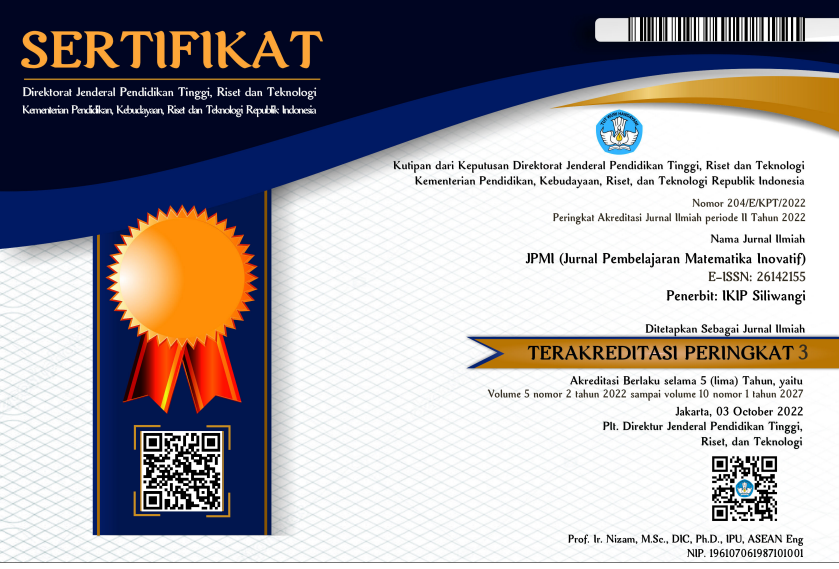ANALISIS BIBLIOMETRIK: TREN RISET EPISTEMOLOGICAL OBSTACLE DARI TAHUN 2000–2022
DOI:
https://doi.org/10.22460/jpmi.v6i3.17583Kata Kunci:
Mathematics, Learning obstacles, Epistemological obstacles, VOSviewerAbstrak
Referensi
Al Husaeni, D. F., & Nandiyanto, A. B. D. (2022). Bibliometric computational mapping analysis of publications on mechanical engineering education using vosviewer. Journal of Engineering Science and Technology, 17(2), 1135–1149.
Brousseau, G. (2002). Theory of didactical situations in mathematics. Kluwer Academic Publisher.
Donthu, N., Kumar, S., Mukherjee, D., Pandey, N., & Lim, W. M. (2021). How to conduct a bibliometric analysis: an overview and guidelines. Journal of Business Research, 133, 285–296. https://doi.org/10.1016/j.jbusres.2021.04.070
Eck, N. J. van, Waltman, L., Dekker, R., & Berg, J. van den. (2010). A comparison of twotechniques for bibliometric mapping: multidimensional scaling and VOS. Journal of the American Society for Information Science and Technology, 61(12), 2405–2416. https://doi.org/10.1002/asi
Effendy, F., Gaffar, V., Hurriyati, R., & Hendrayati, H. (2021). Analisis bibliometrik perkembangan penelitian penggunaan pembayaran seluler dengan vosviewer. Jurnal Interkom: Jurnal Publikasi Ilmiah Bidang Teknologi Informasi Dan Komunikasi, 16(1), 10–17. https://doi.org/10.35969/interkom.v16i1.83
Elfiah, N. S., Maharani, H. R., & Aminudin, M. (2020). Hambatan epistemologi siswa dalam menyelesaikan masalah bangun ruang sisi datar. Jurnal Ilmiah Pendidikan Matematika, 8(1), 11–22.
Ellili, N. O. D. (2022). Bibliometric analysis on corporate governance topics published in the journal of corporate governance: the international journal of business in society. Corporate Governance (Bingley), 23(1), 262–286. https://doi.org/10.1108/CG-03-2022-0135
Gupta, B. M., & Bhattacharya, S. (2004). Bibliometric approach towards mapping the dynamics of science and technology. DESIDOC Bulletin of Information Technology, 24(1), 3–8. https://doi.org/10.14429/dbit.24.1.3616
Haniyah, D., & Joko Soebagyo. (2021). Analisis bibliometrik terhadap kemampuan komunikasi matematis dalam pembelajaran matematika berdasarkan perbedaan gender berbasis VOSViewer. Buana Matematika : Jurnal Ilmiah Matematika Dan Pendidikan Matematika, 11(2), 121–136. https://doi.org/10.36456/buanamatematika.v11i2.3966
Harel, G., & Sowder, L. (2005). Advanced mathematical-thinking at any age: its nature and its development. Advanced Mathematical Thinking: A Special Issue of Mathematical Thinking and Learning, 7(1), 27–50. https://doi.org/10.4324/9781315045955
Herman, H. (2008). Mengajar belajar matematika. Depdikbud.
Hidayat, C. R., Rosjanuardi, R., & Juandi, D. (2019). Epistemological obstacle on the topic of triangle and quadrilateral. Journal of Physics: Conference Series, 1157(4), 1–7. https://doi.org/10.1088/1742-6596/1157/4/042110
Job, P., & Schneider, M. (2014). Empirical positivism, an epistemological obstacle in the learning of calculus. ZDM - International Journal on Mathematics Education, 46(4), 635–646. https://doi.org/10.1007/s11858-014-0604-0
Julius, R., Halim, M. S. A., Hadi, N. A., Alias, A. N., Khalid, M. H. M., Mahfodz, Z., & Ramli, F. F. (2021). Bibliometric analysis of research in mathematics education using scopus database. Eurasia Journal of Mathematics, Science and Technology Education, 17(12), 1–12. https://doi.org/10.29333/EJMSTE/11329
Kandaga, T., Rosjanuardi, R., & Juandi, D. (2022). Epistemological obstacle in transformation geometry based on van hiele’s level. Eurasia Journal of Mathematics, Science and Technology Education, 18(4). https://doi.org/10.29333/ejmste/11914
Kusharyadi, R., Pertiwi, S., Siahaan, E. Y. S., & Dasari, D. (2023). Bibliometric analysis : sofware usage trends geogebra in mathematics learning from 2017 - 2022. 11(1), 196–205.
Maknun, C. L. L. Il, RosjanRuardi, R., & Jupri, A. (2022). Epistemological obstacle in learning trigonometry. Mathematics Teaching-Research Journal, 14(2), 5–25.
Prediger, S. (2008). The relevance of didactic categories for analysing obstacles in conceptual change: Revisiting the case of multiplication of fractions. Learning and Instruction, 18(1), 3–17. https://doi.org/10.1016/j.learninstruc.2006.08.001
Prihandhika, A., Prabawanto, S., Turmudi, T., & Suryadi, D. (2020). Epistemological obstacles: an overview of thinking process on derivative concepts by apos theory and clinical interview. Journal of Physics: Conference Series, 1521(3). https://doi.org/10.1088/1742-6596/1521/3/032028
Rahmah, N. (2018). Hakikat Pendidikan matematika. Al-Khwarizmi: Jurnal Pendidikan Matematika Dan Ilmu Pengetahuan Alam, 1(2), 1–10. https://doi.org/10.24256/jpmipa.v1i2.88
Subroto, T., & Suryadi, D. (2018). Epistemological obstacles in mathematical abstraction on abstract algebra. Journal of Physics: Conference Series, 1132(1), 1–7. https://doi.org/10.1088/1742-6596/1132/1/012032
Suryadi, D. (2019). Landasan filosofis penelitian desain didaktis (DDR) (Tim Gapura Press (ed.); 1st ed.). GAPURA PRESS.
Tambunan, K. (2013). Riset unggulan terpadu: kajian bibliometrika. Jurnal Informasi Dan Dokumentasi, 34(2), 105–122. https://doi.org/10.14203/j.baca.v34i2.176
Tekdal, M. (2021). Trends and development in research on computational thinking. In Education and Information Technologies (Vol. 26, Issue 5). Springer US. https://doi.org/10.1007/s10639-021-10617-w
Tranfield, D., Denyer, D., & Smart, P. (2013). Towards a methodology for developing evidence-informed management knowledge by means of systematic review. British Journal of Managemen, 19(4), 390–406. https://doi.org/10.1016/j.intman.2013.03.011
van Eck, N. J., & Waltman, L. (2010). Software survey: vosviewer, a computer program for bibliometric m apping. Scientometrics, 84(2), 523–538. https://doi.org/10.1007/s11192-009-0146-3
Wahyuningrum, A. S., Suryadi, D., & Turmudi. (2017a). Epistemological obstacles on the topic of ratio and proportion among junior high school students. Journal of Physics: Conference Series, 895(1). https://doi.org/10.1088/1742-6596/895/1/012066
Wahyuningrum, A. S., Suryadi, D., & Turmudi. (2017b). Epistemological obstacles on the topic of ratio and proportion among junior high school students. Journal of Physics: Conference Series, 895(1), 1–11. https://doi.org/10.1088/1742-6596/895/1/012066
Yığ, K. G. (2022). Research trends in mathematics education: A quantitative content analysis of major journals 2017-2021. Journal of Pedagogical Research, 6(3), 137–153. https://doi.org/10.33902/jpr.202215529

















